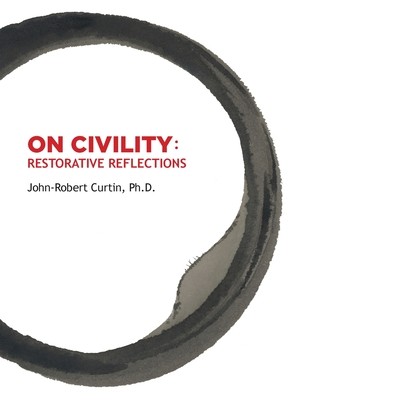
- We will send in 10–14 business days.
- Author: John-Robert Curtin
- Publisher: Old Stone Press
- ISBN-10: 1938462424
- ISBN-13: 9781938462429
- Format: 20.3 x 20.3 x 0.6 cm, minkšti viršeliai
- Language: English
- SAVE -10% with code: EXTRA
Reviews
Description
This collection of poetry centers on my reflections of the concepts surrounding civility, and writing the poems has been restorative to me and to my understanding of this ancient concept.
Beginning with the traditional notion of manners and politeness (George Washington, Rules of Civility & Decent Behavior, 1744), and continuing to the more subtle concepts of compassion, dignity, human value, human worth, forgiveness, and self-dignity, this collection is an attempt to understand and explain a concept that has varied over time and through different cultures. The concept is often connected with civilization and civil because they share the same root word, but civility is more active, more basic, and more personal. "Being civil to one another is much more active and positive a good than mere politeness or courtesy," (Robert B. Pippin, The Persistence of Subjectivity, 2005).
In order to fully comprehend civility, one must reevaluate the status quo and build on the ancient principles of the interdependence of human beings (Dalai Lama, Beyond Religion, 2011). Civility is therefore interconnected with compassion, justice and humanity.
An important research question when contemplating civility is, "When did human life become disposable, and can we reverse that belief?" As much as civility is typically associated with qualities such as politeness and the display of good manners, for contemporary social and political theorists it has increasingly come to represent civic virtues such as tolerance, non- discrimination and public reasonableness.
Civility is therefore "more" than good manners (Melanie White, An Ambivalent Civility, Canadian Journal of Sociology, 2006).
EXTRA 10 % discount with code: EXTRA
The promotion ends in 23d.00:33:20
The discount code is valid when purchasing from 10 €. Discounts do not stack.
- Author: John-Robert Curtin
- Publisher: Old Stone Press
- ISBN-10: 1938462424
- ISBN-13: 9781938462429
- Format: 20.3 x 20.3 x 0.6 cm, minkšti viršeliai
- Language: English English
This collection of poetry centers on my reflections of the concepts surrounding civility, and writing the poems has been restorative to me and to my understanding of this ancient concept.
Beginning with the traditional notion of manners and politeness (George Washington, Rules of Civility & Decent Behavior, 1744), and continuing to the more subtle concepts of compassion, dignity, human value, human worth, forgiveness, and self-dignity, this collection is an attempt to understand and explain a concept that has varied over time and through different cultures. The concept is often connected with civilization and civil because they share the same root word, but civility is more active, more basic, and more personal. "Being civil to one another is much more active and positive a good than mere politeness or courtesy," (Robert B. Pippin, The Persistence of Subjectivity, 2005).
In order to fully comprehend civility, one must reevaluate the status quo and build on the ancient principles of the interdependence of human beings (Dalai Lama, Beyond Religion, 2011). Civility is therefore interconnected with compassion, justice and humanity.
An important research question when contemplating civility is, "When did human life become disposable, and can we reverse that belief?" As much as civility is typically associated with qualities such as politeness and the display of good manners, for contemporary social and political theorists it has increasingly come to represent civic virtues such as tolerance, non- discrimination and public reasonableness.
Civility is therefore "more" than good manners (Melanie White, An Ambivalent Civility, Canadian Journal of Sociology, 2006).


Reviews